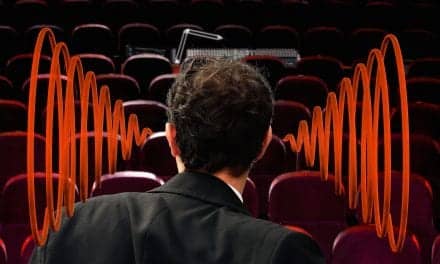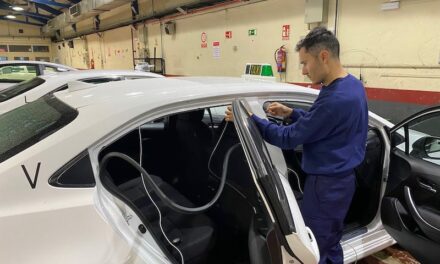Nuance Hearing, a global provider of focused listening technology, announced the launch of a new device that provides “relief from auditory distraction and background noise.”
The Voice Selector Converse helps overcome challenging hearing situations for those who struggle with the ‘cocktail party problem,’ offering “a tech solution to understand conversations in a crowded room, without the need for hearing aids,” according to the company’s announcement.
Using beamforming technology, eight built-in microphones “track the source of sounds, reducing the level of background noise and enabling the user to focus on the dominant voice,” the company says. The result is “a world-leading directivity index (the relative reduction of overall noise in relation to the target sound) of 15dB in real-time performance, which compares to an industry-standard of 4-5dB.” This improvement helps the listener to “focus, effortlessly tuning out the sounds that do not matter and tuning into the ones that do,” according to the company.
In audiology testing, users were able to understand speech “on average three times better than without the product,” according to Nuance.
Ori Goren, CEO of Nuance Hearing, said: “Since 2015, we have been delivering powerful and advanced hearing solutions that deliver optimum performance. We know that many people in the UK are suffering in silence, unable to feel comfortable or enjoy conversing in busy environments, and are proud to have launched an innovative tech solution to help combat this. Through innovative technological solutions, we are passionate about improving the quality of life for a diverse group of people, making every environment more accessible and helping ensure personal success and empowerment.”
New research* suggests that 41% of all UK adults admit to having the ‘cocktail party problem’ where they struggle to understand speech in a noisy environment. Over a third (36%) said noisy environments caused them stress and anxiety and 60% of those with hearing problems said they would be open to trying out tech to help them hear in a busy environment.
The Voice Selector Converse has “auto-steering technology which picks up the dominant speaker, even when they are moving about.” Alternatively the user can manually switch between speakers when conversing a group.
It’s also said to “capture, process, and play audio at a record speed of six milliseconds (0.006 seconds) and is a multifunctional device and can be used as a table microphone or remote microphone – ideal for most scenarios where background noise can be an issue,” the company says in its announcement.
Hearing loss currently affects 12 million people in the UK. The World Health Organization (WHO) estimates that 1 in 5 people worldwide live with hearing loss, expected to rise to 1 in 4 by 2050. Unaddressed hearing loss can have a devastating impact on people’s ability to communicate, study, and earn a living. It can also impact people’s mental health and their ability to sustain relationships1 and has recently been associated with a faster degree of cognitive decline. On average, people wait 10 years before getting help for hearing loss. The ‘cocktail party problem’ where people have difficulty understanding speech in noisy situations can be the first sign of a hearing loss.
Franki Oliver, audiology specialist, RNID, said: “While it might not seem obvious at first, having difficulty understanding speech in background noise is usually one of the early signs of hearing loss. The ‘cocktail party problem’ is the name used to describe the brain’s inability to filter out background noise and tune into what someone is saying in a busy environment. Most people with hearing loss experience difficulty in these situations.
“It’s important to check your hearing if you start to notice difficulty in background noise, feel that people mumble, or you ask people to repeat themselves. It’s second nature for people to have their eyes checked regularly but we don’t have the same attitude towards getting our hearing checked yet. The sooner hearing loss is identified, the earlier someone can start benefiting from life-changing hearing devices. Hearing loss can also be linked to conditions such as dementia so early intervention is vital.”
- The World Health Organization (WHO) press release. WHO: 1 in 4 people projected to have hearing problems by 2050. https://www.who.int/news/item/02-03-2021-who-1-in-4-people-projected-to-have-hearing-problems-by-2050. Published March 2, 2021.
*Survey carried out by Opinium on behalf of Nuance Hearing. Surveyed 2,000 UK adults with differing levels of hearing ability.
Source: Nuance Hearing
Images: Nuance Hearing






